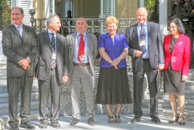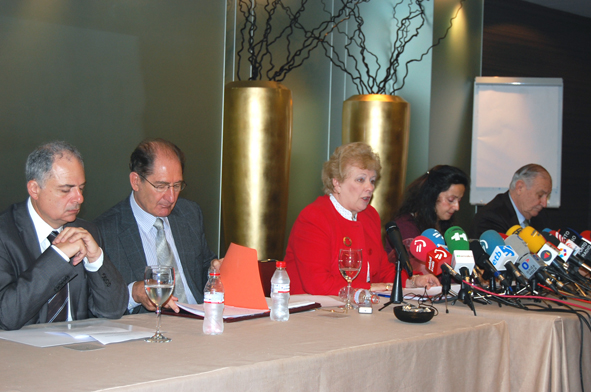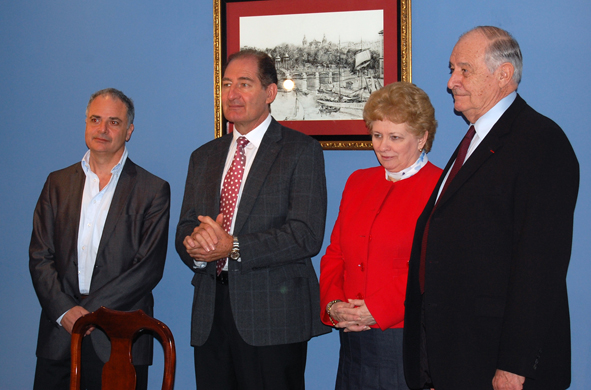Interview with Brian Currin
This interview was published on April 7 in the newspaper Deia. The online version in Spanish is available at these links: Part I and Part II.
You have been disappeared in the last months, at least in the Basque Country. Have you stepped back now that ETA has announced the end of violence and Sortu is legal?
The legalization of SORTU and the irreversible end of ETA violence were, as I have always emphasized, essential requirements for a successful peace process. The fact that violence has been removed from politics in the Basque Country does not mean that the conflict has been resolved. The fact that I and the ICG as a group have not been prominent does not mean that we have stepped back. There is still plenty of work to be done.
It seems that the International Contact Group has lost prominence in favour of the verificators.
An essential aspect of the ICG’s mandate was international verification of ETA’s ceasefire. To achieve that, we initiated the establishment of the verification commission, but, as a complete separate and independent body. They have done remarkably good work in building and maintaining confidence in ETA’s ceasefire and declaration ending military action. They have paved the way for further confidence building measures and eventually a resolution of the political conflict.
The inclusion of the abertzale left in the Basque Parliament has reduced the scope for action of your group.
Putting aside the fact that we will all miss your wonderful country and people, one of the happiest days of my life will be when the scope of action for the ICG has been reduced to nothing. The return of the Abertzale Left to parliament is a victory for democracy in the Basque Country; however, the political conflict remains unresolved.
And what is your recipe?
An important mandate of the ICG, which has not been fulfilled, relates to multi-party talks between political parties in the Basque Autonomous Community, the Community of Navarra and in Iparralde. And, as I have said, there are essential confidence building measures that remain unattended to: the decommissioning of arm, the dissolution of ETA as a militant organization, a review of penitentiary policies and a review of security laws and practices to accommodate the new political reality in the Basque Country, in Spain and in France. There is much work still to be done.
What other tracks are necessary in addition to the Parliament and the institutions of the Basque Autonomous Community?
Engagement between ETA, Madrid and Paris are necessary in order to give effect to the confidence building measures I have just mentioned. There is also a need for separate tracks involving political parties in the Community of Navarra and Iparralde France. It is the parties’ responsibility to decide whether those engagements happen within or outside of the State institutions.
But is the Parliament enough for that?
For a peace process to be successful it needs to be inclusive. That means engagement cannot be limited to political parties. Deep participation by social parties and civil society is essential especially when dealing with issues such as memory, truth and reconciliation which have a profound impact on victims, perpetrators and society as a whole.
Do you keep meeting with political parties and other actors?
Yes we do.
What level of communication do you have with the lehendakari Iñigo Urkullu?
From my experience the Lehendakari Inigo Urkullu is one of the outstanding leaders in the Basque Country. I believe that he will play a very important role in the unfolding peace process. The ICG met him on many occasions when he was President of the PNV. Although I have not yet had the privilege of meeting with him in his new role, I look forward to doing so in the near future.
How do you assess the steps taken by this Government regarding peacemaking?
When you refer to “this Government” I assume you are referring to the Basque Government. I believe they are moving in the correct direction.
Do you find it positive the appointment of Jonan Fernandez as head of the general secretariat for Peace and Coexistence?
Notwithstanding the response to his appointment from the PP, I do believe the appointment of Jonan Fernandez is positive. The position: head of general secretariat for peace and coexistence requires a person with unique skills and human qualities. What are those?: an excellent intellect; sensitivity and empathy; an effective communicator – someone who listens to the views of others and has the ability the respect those views as if they were his or her own views; an experienced reconciler. In my view Jonan Fernandez has all those qualities. I sincerely hope that in time the PP realizes and acknowledges these special qualities that make him the ideal person for the job.
What do you expect from the Commission for Peace and Coexistence of the Basque Parliament?
As we know there is very little trust between some of the political parties in the Basque Autonomous Community. The first important task of the Commission for Peace and Coexistence is to build a level of trust that will enable them to begin to work together with a common objective: a peaceful resolution of the political conflict notwithstanding the fact that their desired outcomes may be very different.
Basque society, in its majority, considers as a given the announcement of the end of violence and asks directly and with no condition the dissolution of ETA. Why doesn’t ETA meet this social outcry?
I can understand the need of the majority of Basque society for ETA’s dissolution. However, surely it is premature to speak of dissolution before ETA has decommissioned its arms. Arms in circulation are their responsibility. How can they dissolve whilst they still have arms under their control? In every peace process of which I am aware decommissioning has required at least bi-party engagement, which includes the appropriate government.
But the Spanish Government doesn’t seem to be willing to give in.
If Madrid and Paris were to follow the Aiete roadmap and engage with ETA on the consequences of the decades of violence as called upon by Kofi Annan and others, I am confident that decommissioning of ETA arms would be one of the results of that engagement, which would inevitably lead to the dissolution of ETA in the same way as other militant groups in different parts of the world have dissolved after decommissioning arms.
The Spanish Government, the PP and the Socialist Party keep accusing you of acting on behalf of abertzale left. What do you have to say to them?
I believe in freedom of opinion and freedom of expression. If that is their perspective I must respect that. I can understand why they hold that view: my entre to the Basque Country was at the invitation of Abertzale Left. However, my objective has never been to act on their behalf or to strengthen their cause for independence. My sole objective has been to assist in whatever way I can to take violence out of Basque politics in order to pave the way for a political resolution to the political conflict.
How can you move forward in your job if the ones that have most of the keys, the Governement of Rajoy, don’t even give the time of day?
That is a very good question, the answers to which we are at this very moment trying to find. One of the purposes of the recent social forum for peace was to find ways of moving forward despite Madrid’s reluctance to follow Kofi Annan’s roadmap as expressed in the Aiete Declaration. The contributions during the social forum in March this year were of the highest standard and we have extracted some very good lessons from international experiences which I believe will help the parties through the current impasse. Besides that, it should be remembered that not all progress with the peace process is dependent on the Spanish or the French Government. In fact at a discrete level there has been engagement between political parties in Euskal Herria which the ICG finds very encouraging indeed.
Should ETA disarm without waiting for the Spanish Government to make a gesture?
I do not as yet, in my own mind, have an answer to that question. But let us not forget that the decision when to disarm and to whom decommissioning should take place is ultimately a decision that rests with ETA. Disarmament is by its nature an action that must be carried out with great care and meticulous planning. I am not aware of an example anywhere else in the world where a Government has refused to participate in voluntary disarmament by an anti-state armed group.
Is there any other option for ETA to disarm without coordination with the Spanish Government? What?
I cannot say more than what I have already said in my previous answer.
Should the abertzale left (Sortu, EH Bildu…) put pressure on ETA to move towards disarmament?
Since I do not have clarity in my own mind as to how disarmament can take place given the approach taken by both Paris and Madrid I cannot say that the AL should put pressure on ETA disarm.
Did Norway give in to the pressure of Spain to expel the leadership of ETA?
I do not know the answer to that question.
Were there communication channels between ETA and the Spanish Government?
If you are talking about recently – again I do not know the answer to that question.
Does the expulsion from Norway complicate the process, blocks an ordered end?
It could complicate the process but I do not believe that it will necessarily block an ordered end.
How and who should resume the dialogue with the leadership of ETA?
My position is clear on this. Both the Spanish Government and the French Government should engage with ETA as set out in the Aiete Declaration. If they were to do that, further progress would be relatively quick and very substantial. I would like to emphasize that engagement as provided for in the Aiete Declaration does not require negotiations with ETA on any of the substantive political issues. The engagement would be on the consequences of the violence only: disarmament, prisoners, exiles, victims and security measures.
In your opinion, is this one of the most difficult moments?
In terms of process this is certainly a difficult moment. Needless to say there have in the past been far more difficult moments. So I remain positive. But I can assure you there will in the future also be far more difficult moments.
Is there a risk of split within ETA?
The Abertzale Left has always been mindful of that risk, being aware of what happened in Northern Ireland, and has taken every possible step, in their own process towards the establishment of SORTU, to ensure unanimity within the whole of the Abertzale Left. There is, however, always the possibility that a few individuals break away if the lack of progress with a peace process persists indefinitely.
What did you think about the declaration of Garikoitz ‘Txeroki’ before the judge in Paris regretting only the collateral damages?
From my experience in other peace processes, Garikoitz “Txeroki’s” declaration of regret would, for him, have felt like a very significant concession. For those who feel it was not enough, patience and time will narrow the gap between what perpetrators say about the past and what victims expect them to say.
Must abertzale left explain why during decades they have encouraged a violent strategy that now they have abandoned?
I sincerely hope that at some stage in the future all the parties to the conflict realize the need to set up appropriate mechanisms that enable all perpetrators and all victims to participate in such a way that: history is recorded truthfully – the good and the bad; there is acknowledgment of pain and suffering caused to others; there emerges an acceptance that the other side’s perspective and interpretation of history is as legitimate as one’s own and; reconciliation ensues (ocurre) to the extent that diversity in Euskal Herria becomes a strength rather than a cause for conflict.
The Verification Commission considers its dissolution in September. What does this mean in your view?
My understanding of the most recent statement issued by the Verification Commission is that, according to their assessment, ETA has complied completely with its ceasefire declaration. If that situation continues until September the Verification Commission may conclude that their work has been completed.
Have you, the ICG, thought about or are thinking on dissolving?
The work of the ICG is subject to the mandate it received from the political and social parties with which it consulted during 2010. Until such time as that mandate it terminated or until the ICG concludes that there is not a genuine commitment to a sustained peace process we will continue with our work. Our mandate has not been terminated and on our assessment the majority of the political parties who represent the vast majority of the people of Euskal Herria are without reservation totally committed to a peace process that will eventually resolve the political conflict according to the democratic will of the majority of the people of Euskal Herria.


